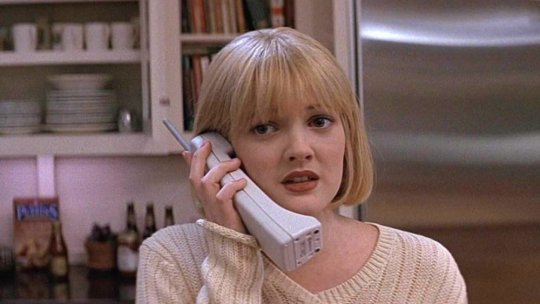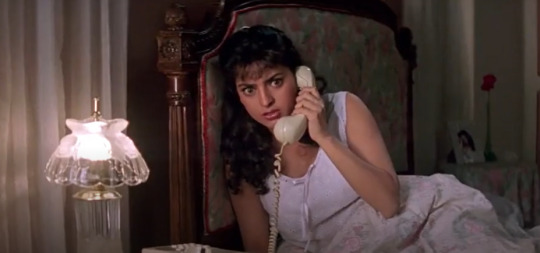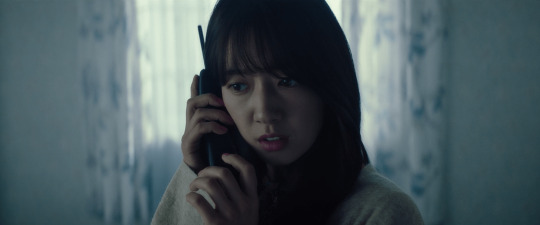Text
“On her way back across the campus she did not find anything particular in her mind to identify this evening beyond others marked in other ways. There was a strong feeling of triumph and an odd feeling of vengeance, and once when she stopped under a tree and leaned her head against its firm rough trunk she whispered softly, ‘I know, I know.’ But that was all; beyond that she seemed to have nothing to say to herself.”
— Shirley Jackson, Hangsaman
16 notes
·
View notes
Text
“‘I was thinking about when I would be dead,’ Natalie said.
‘Dead?’ he said, surprised. ‘Are we going to die, you and I?’
‘I only worry about how,’ Natalie said soberly; unlike most of the things she found herself saying to Arthur Langdon, this was true. ‘I keep thinking that of course it’s got to happen, and even to me, but then I always think that somehow and someday this interesting person of mine will . . .’ She searched for a word. ‘Subside,’ she said finally. ‘I mean, I will be very suddenly aware of an ending, and that there is not going to be anymore for me, and that I am not going to be with myself any longer. And all of that’s all right,’ she said, going on quickly as he opened his mouth to speak. ‘I’m only afraid of being caught unaware, of that terrible fast panic that comes when you’re very very frightened, and of being afraid when it happens. So then, of course, I always think I’ll kill myself before it can happen.’
She stopped, and Arthur Langdon said, ‘You have a very original mind, Natalie.’
‘That’s what I mean,’ she said, thinking, Oh, the fool, ‘can you imagine having a mind like mine and losing it when you die?’ Had she, she wondered, had she the original mind?”
— Shirley Jackson, Hangsaman
10 notes
·
View notes
Text
“Natalie, looking at them with a frank stare possible only because they were both looking at Arthur and for the moment ignoring both herself and Elizabeth, saw with the irritation she was beginning to know as jealousy that they were both lovely, in the way that Elizabeth Langdon was lovely: the rounded, colorful, rich beauty of girls who have been pretty babies and pretty little girls and pretty boarding school girls and who have, at last, in college, reached a fulfillment of prettiness because they are finally nubile; that their loveliness would be deadened as Elizabeth’s had been deadened was not more than a small consolation to Natalie; that this loveliness built and recharged with an awareness of loveliness, and almost certainly masked vacant stupidity, was no consolation at all. The further thought that, premising the loveliness of young women as nature’s infallible way of insuring them husbands, these two could at best marry no more than a few of the men in the world, was less than no consolation at all.”
— Shirley Jackson, Hangsaman
1 note
·
View note
Text
“What a silly routine, Natalie thought, not realizing, sitting there alone on the stool in the center of the ring of girls, how she was jeopardizing her own future in college, her own future for four years and perhaps for the rest of her life; how even worse than the actual being a bad sport was the state of mind which led her into defiance of this norm, this ring of placid, masked girls, with their calm futures ahead and their regular pasts proven beyond a doubt; how one person, stepping however aside from their meaningless, echoing standards, set perhaps by a violent movement before their recollection, and handed down to them by other placid creatures, might lose a seat among them by questions, by rebellion, by anything except a cheerful smile and the resolution to hurt other people.”
— Shirley Jackson, Hangsaman
1 note
·
View note
Text
“‘A mother gets very lonesome without her daughter,’ Miss Waite said. ‘Especially when it’s an only daughter. A mother gets lonesomer than anything in the world.’
One of the things which Natalie most disliked about her mother was Mrs. Waite’s invariable trick of putting serious statements into language that Natalie classified as cute. Mrs. Waite, too long accustomed to seeing her most heartfelt emotions exposed, discussed, and ignored, had long since fallen into protecting herself by stating them as jokes, with an air of girlish whimsy which irritated both Natalie and Mr. Waite as no flat statement of hatred could have. Because of this, Natalie—who had sometimes thought of running to her mother with a voluntary expression of affection—said briefly, ‘You’ll find something to do.’”
— Shirley Jackson, Hangsaman
37 notes
·
View notes
Text
“At that time, of course, Natalie reflected with contentment, her life would be done. There would be no further fears for Natalie, no possibility of walking wrong when you were no more than a skull in a strange man’s hands.”
— Shirley Jackson, Hangsaman
26 notes
·
View notes
Text
“In his history of German film art, a Nazi-minded product with some remnants of pre-Nazi evaluations, Oskar Kalbus connects the vogue of historical pageants with the moment of their production; they were produced, he contends, ‘because in times of national emergency people are particularly susceptible to representations of great historic periods and personalities.’ He completely overlooks the fact that this susceptibility was betrayed by films representing not so much historical periods as personal appetites and seeming to seize upon history for the sole purpose of removing it thoroughly from the field of vision. It is not as if the historical films of Italian or American origin had ever achieved miracles of perspicacity; but the sustained lack of comprehension in the Lubitsch films is significant inasmuch as they emerged at a moment when it would have been in the interest of the new democratic regime to enlighten the people about social and political developments. All these German pageants which the Americans mistook for summits of ‘historical realism’ instinctively sabotaged any understanding of historic processes, any attempt to explore patterns of conduct in the past.”
— Siegfried Kracauer, From Caligari to Hitler: A Psychological History of the German Film
1 note
·
View note
Text
“It also reinforces one of the essential thematic concerns of haunted house tales: their fascination with history and the consequences of history, the danger of crimes that fester undiscovered and unpunished.”
— Dale Bailey, excerpt from “Too Bad We Can’t Stay, Baby!” of American Nightmares: The Haunted House Formula in American Popular Fiction
724 notes
·
View notes
Text
need to write an essay abt how most horror movies centered around haunting aren't actually about the haunting but are instead horror stories about economical desperation ("someone died here but it's the only place we can afford" + "we already claimed the house, we don't have money to move again") & the terror of no financial mobility + a flawed reinforcement of the white american standard that the father should protect his family to the point of dismissing his wife & kids while also conquering land/property that is not his ("this house was built on a native american burial ground")
4K notes
·
View notes
Text
someone unearthed this and it’s been getting notes, but it’s come to my attention that this website no longer /exists/ as it once did, alas. you can probably find most of these online anyways, but if anyone is having trouble tracking them down feel free to message me, i still have the pdfs so i can share them or w/e.
essays on Blue Sunshine’s website (leftovers from a horror film syllabus, I think)
Robin Wood, “Horror in the 70s,” The American Nightmare: Essays on the Horror Film
Barbara Creed, “An Imaginary Abjection,” The Monstrous-Feminine: Film, Feminism, Psychoanalysis
Linda William, “When the Woman Looks”
Carol Clover, “Her Body, Himself: Gender in the Slasher Film”
Steven Shaviro, “Bodies of Fear: The Films of David Cronenberg”
Noël Carroll, “Why Horror?,” The Philosophy of Horror, or Paradoxes of the Heart
Cynthia Freeland, “Horror and Art-Dread”
158 notes
·
View notes
Note
Hello! Could i possibly request a pdf/ebook/any format of diana fuss’s monsters of perversion?
hey! i wish i could help, but i've had no luck either with finding the full thing; if you g**gle it then a g**gle books result pops up for media spectacles, the book it’s part of, and if you click that then you can read some of “monsters of perversion,” and that's what the quotes on my blog are from. (even there, a few pages are randomly blocked *rolls eyes*).
EDIT: i’m a dumbass; the book is on libgen, i’ve just been searching for the essay title all these years. 😅 so um you know. or if u don’t know how to use that then u can hmu off anon.
5 notes
·
View notes
Text



The telephone’s influence is so pervasive that only when things go wrong with the technology – for example, a thunderstorm renders it inoperative – do our problem of isolation becomes apparent. Suddenly we cannot call the police or the ambulance for help, and friends who might otherwise provide companionship and advice become unreachable. Isolated, we find ourselves at our most vulnerable – and if it’s the killer who has cut the line, then we also feel a sense of threat.
Charles Spiteri, "Isolation, the Telephone and the Slasher Film"
3K notes
·
View notes
Text
To experience the real is to experience horror, which is often accepted as normal or even invisible. Horror is of course material and present, and our individual, social, and political bodies are shaped in large part by either responding to it or not. However, the current social body, especially as it functions under panoptical power, sometimes has an easier time accepting existent horror as simply an illusion of reality, as some unpleasant, walking daydream that never escapes the realm of the suppressed. We need to see that our conceptions of reality have been hijacked by the unjust, fragmented social body designed for profit and by the absence of an applicable – not only discursive – idea of the commons. […] [W]e need new modes of production (of life) […]. In the present world, in the life offered by our state and political apparatuses, we can see, as if through a palimpsest, the dominion of carelessness. […] At present, we live in cruel times in which market parameters are also applied to practices of ontological exchange – of identities, thoughts, and feelings. […]
Alice’s journey this time is not in Wonderland, but in the land where our longing and our bodies are thrown on the garbage heap of economic and political violence. Alice finds herself in the infinity of emptiness, in a hall of mirrors showing crooked images of reality instead of what she’d wished to see. In these reflections, reality is simulated through a false overcrowding of activities, actions, products, “projects,” “works” – all sorts of engaged acceleration. And the rabbit is always late and never manages to get to the most important tea party. And he is confused because the celebration is still going on, but without him. Fear has become the only consistent thing that can retrieve and construct the stories we tell about our wholeness, about the justification of our existence here and now – our avowals that we are not virtual, that our lives are not phantasms, that we are not writing them out by following certain commands. […]
Oblivion, rejection, erasure, and effortless replacement – these are the new paradigms for survival, for sparing us from bare life. And for this very reason, this life could be characterized as the story of a constant, uninterrupted string of endings. […] The world is at war again. This is not a traditional conflict between sovereign political entities, that is, nation-states; there are new, supranational forms of sovereignty – a global empire that has changed the forms and nature of war and of political and economic, and even aesthetic, violence. […]
And indeed, the attraction of night-lights grows proportionally with the darkening of the external world.
——-
Iskra Geshoska. “The Collective Alice, or, on Fear, Death, Multitudes, Pain.” e-flux. June 2021.
102 notes
·
View notes
Text
“Horror films appeal to this kind of dreaming through the figures of seer and ‘first victim,’ and thus to the audience’s desire to glimpse the truth, no matter how horrible. [...] In science fiction the visionary is usually rewarded, in horror, punished. [...] The wish such a horror film fulfills is that of seeing, and the world view it confirms is that ‘the other side’ is real. In other words, David is a surrogate for the audience’s desire to have, through watching a horror film, a spiritual vision. The satisfaction of being ‘first victim’ is that one knows the hidden truth.”
— Bruce Kawin, “The Mummy’s Pool,” Planks of Reason: Essays on the Horror Film (Ed. Barry Keith Grant)
252 notes
·
View notes
Text
The house is a metaphor for the subconscious mind. When a vampire is invited into one’s house, it is symbolically invoked into one’s personal subconscious, where it is then free to feed upon one’s spiritual vitality. This is why the vampire’s visitations occur overnight, when one is asleep and dreaming, and most vulnerable to entities in the subconscious mind. The coming of the female ghost-vampire unfolds a tale of forbidden, exclusive female desire. Carmilla, in fact, represents the subconscious sexual instinct Laura has had to repress.
[…]
By letting the vampire enter her dream-reveries/psyche, Laura is invoking a phantasm that can satisfy her secret repressed desire and destroy her at the same time in order to expiate her sense of guilt. But the descriptions of her vampiric visitations in terms of an unspeakable jouissance hint at the troubling fact that she might not want to be cured from her ‘evil’.
—Laura Sarnelli, Ghostly Femininities: Christabel, Carmilla, and Mulholland Drive
712 notes
·
View notes
Text
“I underwent, during the summer that I became fourteen, a prolonged religious crisis. I use the word ‘religious’ in the common, and arbitrary, sense, meaning that I then discovered God, His saints and angels, and His blazing Hell. And since I had been born in a Christian nation, I accepted this Deity as the only one. I supposed Him to exist only within the walls of a church—in fact, of our church—and I also supposed that God and safety were synonymous. The word ‘safety’ brings us to the real meaning of the world ‘religious’ as we use it. Therefore, to state it in another, more accurate way, I became, during my fourteenth year, for the first time in my life, afraid—afraid of the evil within me and afraid of the evil without.”
— James Baldwin, “Down at the Cross: Letter from a Region in My Mind,” The Fire Next Time
101 notes
·
View notes
Text
“What this shows is that there is no safety in ignoring the Id/Underworld/monster (the attitude of the ineffectual patsy in most horror films, e.g., the mayor in Jaws and Helen’s modern boyfriend [David Manners] in The Mummy) but that there is considerable strength in confronting the danger and surviving that deeply acknowledged contact—in other words, re-owning the projection. In this sense horror films are valuable and cathartic, for they may offer the possibility of participating in the acting-out of an unacknowledged wish or fear in a context of resolution rather than of repression. This is of course what happens to Helen and not to the Mummy. He is a walking repetition compulsion, determined to complete his frustrated sacrilege and consummate his romance (the sexist aspects of all this are quite blatant in the film). He would have her ‘go through moments of horror for an eternity of love,’ but what he means by love is the insatiability of unconscious drives (which are, to be fair, often involved in fantasies of eternal romances). There is value, then, not in being Imhotep but in, like Helen and like the audience, almost being Imhotep.”
— Bruce Kawin, “The Mummy’s Pool,” Planks of Reason: Essays on the Horror Film (Ed. Barry Keith Grant)
12 notes
·
View notes